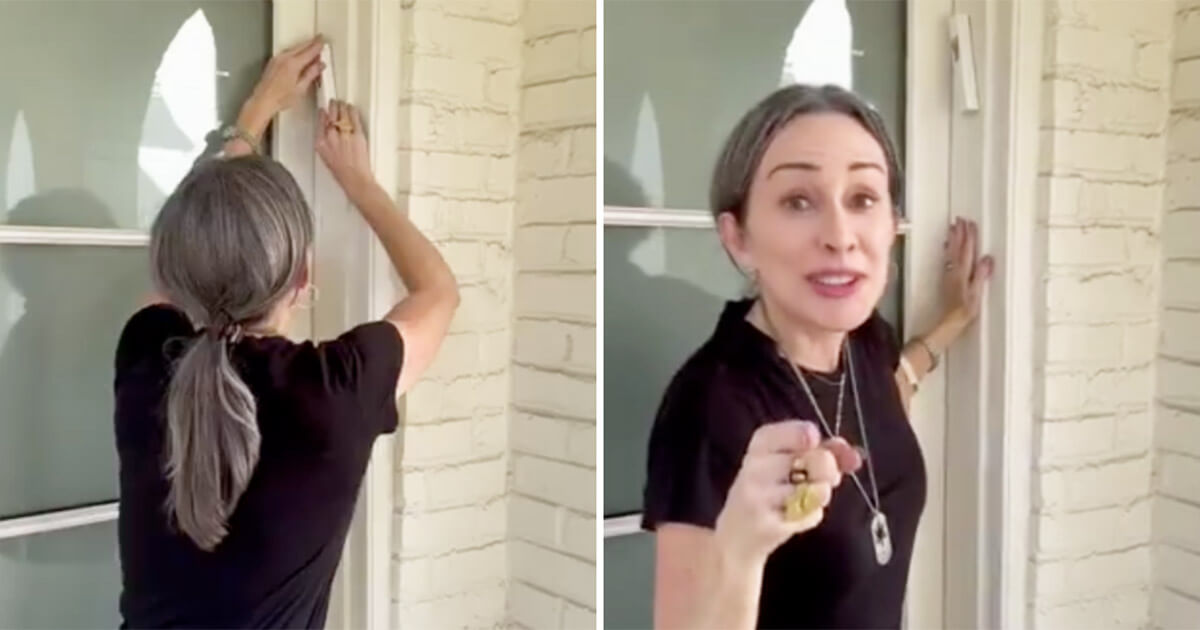Sitcom star encourages non-Jews like her to hang mezuzahs on their homes
In effort to show solidarity with Jewish community, some see campaign as cultural appropriation

Actress Patricia Heaton launched the #MyzuzahYourzuzah campaign. Courtesy of Patricia Heaton
Actress Patricia Heaton is encouraging non-Jews to hang a mezuzah on the front doors of their homes.
The Catholic sitcom star — most famous for her roles on The Middle and Everybody Loves Raymond in the 1990s and 2000s — launched a campaign, called #MyzuzahYourzuzah, with a post Monday to her more than 1 million followers across social media.
“Show solidarity with your Jewish friends and neighbors,” she wrote. “Fight antisemitism and bless your household.”
Heaton is the founder of the Oct. 7 Coalition, a network of Christians who speak out against rising antisemitism in the U.S. After the Oct. 7 Hamas attack, Heaton said she “was outraged” and created the group to counter the pro-Palestinian protests she was seeing across college campuses.
Jewish college students have had mezuzahs that were “ripped off and vandalized and smashed,” she said. “We have to stand up for the Jewish people and their right to exist.”
As we head toward the one year anniversary of October 7th, I ask that you please join me in the #MyzuzahYourzuzah campaign to show solidarity with your Jewish friends and neighbors, fight antisemitism and bless your household. Here’s how you can participate:
— Patricia Heaton (@PatriciaHeaton) September 23, 2024
1. Purchase a… pic.twitter.com/YLkseXU5nx
The Emmy-winning actress, whose father fought the Nazis during World War II, has become increasingly vocal in her advocacy for the Jewish state in the past year. In November, she attended the March for Israel rally in D.C. and has since attended events for hostage families and been feted by the Israeli American Council.
But she has long been moved to support Jews and Israelis. In a recent interview, Heaton told an Israeli news outlet that when she first relocated to Los Angeles, decades ago, she noticed an elderly woman walking on the treadmill next to her at the gym. “She had numbers tattooed on her arm, and it hit me like a gut punch,” she said. It just makes you realize that this history is still with us, and we still have to be vigilant about it.”
The campaign
MyZuzah is a Maryland-based Jewish nonprofit that provides one free kosher mezuzah scroll to any Jew who requests it — “no matter where you are,” said Alex Shapero, the group’s program director. “It can be someone in Des Moines, someone in Denver, someone in the cliffs of Dover in England. It’s on the house, pun intended.”
People who want can buy more mezuzahs for the rest of the doorways in their home through the organization.
Heaton partnered with MyZuzah and is asking her non-Jewish followers to purchase mezuzahs from the group (only Jews get free ones) and to share photos on social media of the hanging mezuzahs along with the hashtag #MyzuzahYourzuzah.
“It’s a very public way for non-Jews to stand up and show their support in a very well-intentioned way,” Shapero said.
The campaign echoes past campaigns, including two in Montana, in which non-Jews have stood up for Jews.
After neo-Nazis threatened an armed march in 2016 on the town of Whitefish, Montana, the police chief nailed a mezuzah to the doorframe of the police station, in a gesture of solidarity with the Jewish community. In 1993, after an antisemitic incident in Billings, Montana — which was home to only a few hundred Jewish families at the time — the town’s non-Jewish residents displayed roughly 10,000 menorahs throughout the city.
The backlash
But some see issues with Heaton’s mezuzah campaign, accusing the Christian participants of culturally appropriating a Jewish tradition. “This is problematic, Patricia,” wrote one commenter on X. Another posted: “While this is a nice gesture, having a mezuzah is a mitzvah for Jewish people and it shouldn’t be used by others.”
Julia Ioffe, a Jewish journalist who writes for Puck, shared the hashtag, “#DefinitelyNotYourzuzah.”
Shapero clarified that what many non-Jews are doing is merely buying a case, which accomplishes having a public display in solidarity with the Jewish community — but without the inside scroll containing verses from Deuteronomy, known as a klaf in Hebrew.
“Patricia’s call to action was basically to put up a case,” he said. “There are some people who have chosen to purchase a kosher klaf to go along with it. We’ve been very clear about the terms that we sell them the klaf, that it has to be respected and taken care of.”
Rabbi Mark Wildes of the Manhattan Jewish Experience agrees. “I don’t think there’s a technical prohibition in doing that,” said Wildes, who is Orthodox. “And if they’re gonna use a klaf, they’ve got to make sure that it’s done properly.”
“Anything that shows solidarity with the Jewish people and the state of Israel, it’s a beautiful thing,” Wildes said. “We need all the friends we can get. To publicly display an authentically Jewish symbol, it’s very heartwarming.”















